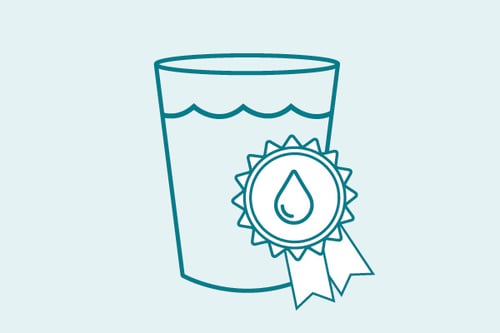Your water quality
Your water is treated and checked at every stage of its journey to your tap. Sometimes it can taste, smell, or look different, but this is usually a temporary issue and nothing to worry about.

Water is a vital part of our everyday lives.
The UK has some of the highest standards of water quality, making it among the safest in the world. Your water is treated and checked at every stage of its journey to ensure it is clean, clear, safe and great tasting when you turn on your tap.
Occasionally, your water can look, taste or smell different to usual, which you may find concerning. More often than not, this is down to a harmless change that may be short lived or something that is simple to resolve.
Use the links below to get more information on specific areas of your water quality.
How we make sure your water is clean and safe to drink
It takes a lot of hard work to treat water and get it to your tap, whilst ensuring that it’s the highest quality. Find out about the steps that we take to treat ‘raw’ water and get it to your tap.

Water quality testing
We regularly visit our sources and treatment works to test the water by taking samples, to ensure the treatment process is working correctly and meeting regulatory standards.
Water hardness
Water in the Bristol Water area is moderately hard to very hard. Due to soft rock, limestone easily dissolves, increasing the levels of calcium and magnesium in the water, making the water hard.
Water taste and smell
In general, tap water should have no noticeable taste or smell to it, with the exception to Chlorine. Most unusual tastes and smells to tap water are caused by plumbing problems in the home.
Water appearance
Your tap water will normally be clear and bright. Very occasionally, you might notice a change in how it looks. There are different reasons why this might happen.
Water mains flushing
So that you can enjoy the best water possible, and to keep our networks in top condition, we often carry out something called ‘flushing’ as part of our ongoing maintenance work.
Lead
If you have lead pipework or fittings in your home, small amounts can dissolve into your tap water. There are still many properties in the Bristol Water area, built before the 1970s, that have lead pipework.
Fluoride
We don't add fluoride to our drinking water and never have done. In some parts of the UK, hexafluorosilicic acid is added to the water to artificially increase the level of fluoride in the drinking water.
Chlorine
We add a small amount of chlorine during the final stages of treatment to ensure the tap water is free from bacteria. It is a legal requirement to disinfect water and have chlorine in the water when it reaches you.
PFAS or 'forever chemicals'
PFAS, otherwise known as 'forever chemicals' are present everywhere in the environment. PFAS is a chemical family consisting of at least 5,000 individual substances.
How do I report an issue with my water?
If you have an issue with your water, you can check to see if there are any ongoing incidents in your area that might be affecting your supply.
If you’re trying to report a leak, you can find out more information and do this through our leak report contact page. Alternatively, if you want to contact us about anything else related to your water, you can do this through our water supply contact page.